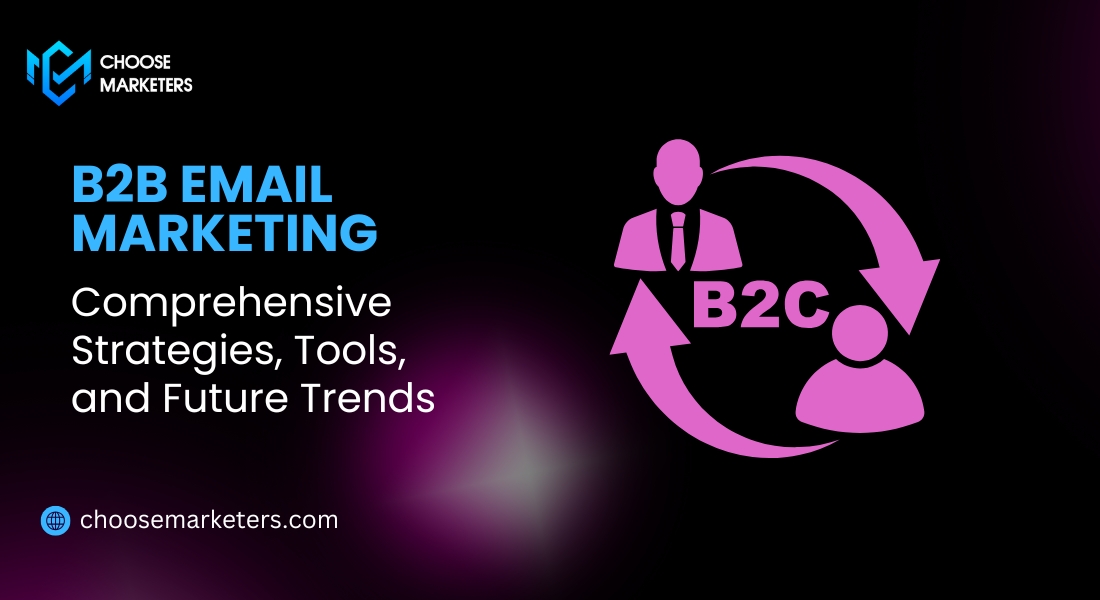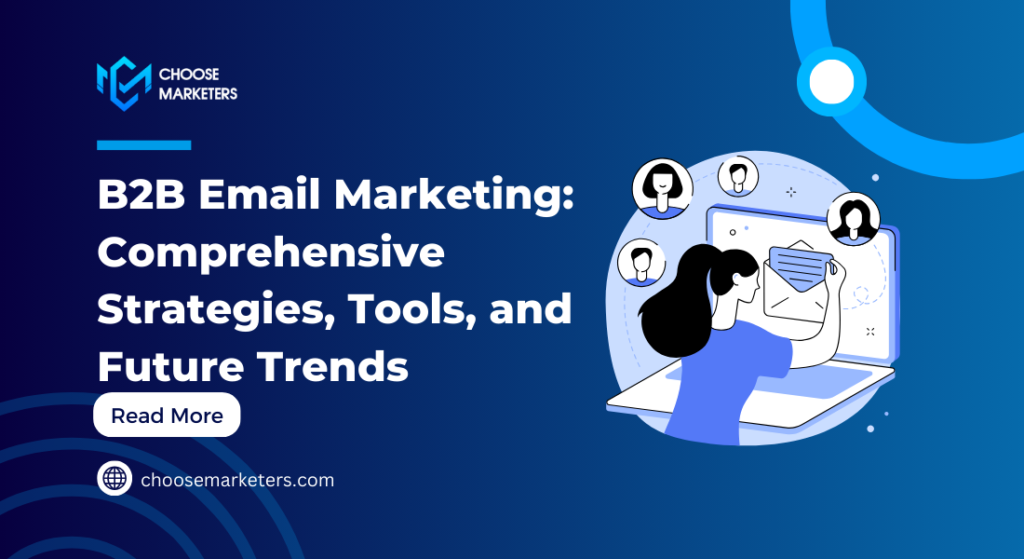

B2B Email Marketing: Comprehensive Strategies, Tools, and Future Trends
B2B email marketing continues to be one of the most effective tools for engaging with leads, nurturing prospects, and retaining clients. While B2C marketing often revolves around quick conversions, B2B email marketing focuses on building long-term relationships, educating prospects, and guiding them through extended sales cycles.
This blog delves into every aspect of B2B email marketing, covering key strategies, tools, and techniques to help you maximize your email campaigns. Whether you’re looking to automate your processes, personalize emails, or integrate AI into your strategy, this guide will cover everything you need to know.

Introduction to B2B Email Marketing
B2B email marketing is the process of sending targeted emails to decision-makers within businesses. Unlike B2C emails that focus on instant sales, B2B emails emphasize relationship-building, delivering valuable content, and positioning your business as a trusted advisor. These emails cater to specific business challenges, offer industry insights, and are often educational in nature.
The long sales cycles typical of B2B markets make email marketing a critical tool for keeping leads engaged over time, providing timely information at each stage of the buyer’s journey.
Why Email Marketing is required for B2B Success
For B2B companies, email marketing is more than just a communication tool—it’s a core strategy for nurturing leads and converting them into clients. The B2B marketing funnel involves multiple touchpoints, with email being the consistent thread that ties them all together. Here’s why email marketing is essential for B2B success:
Lead Generation and Nurturing: Email is a low-cost, high-impact method for generating and nurturing leads. Automated workflows can be set up to deliver personalized content at various stages of the funnel, helping move leads from awareness to consideration and finally, to decision-making.
Building Trust: In B2B marketing, trust and credibility are critical. Regular emails that provide valuable insights or industry-specific information can position your brand as a trusted partner.
Customer Retention: Email marketing is an effective tool for client retention, helping businesses maintain relationships with existing clients through regular updates, new product announcements, and customer success stories.
Core Features of B2B Email Marketing Automation
Automation is the foundation of modern B2B email marketing. With longer sales cycles and complex customer journeys, automation ensures that leads are consistently nurtured without manual intervention. The following are key features to prioritize in your email automation platform:
Automated Workflows: Automated workflows allow you to create sequences of emails that are triggered by specific actions, such as signing up for a newsletter, downloading an eBook, or abandoning a cart. These workflows keep leads engaged and help guide them through the buyer’s journey.
Advanced Segmentation: Not all prospects are alike, and sending the same message to everyone is ineffective. Segmentation allows you to divide your email list into smaller groups based on behaviors, demographics, or industry, making your emails more relevant to the recipient.
Personalization at Scale: Personalization goes beyond using a recipient’s name. With advanced automation tools, businesses can personalize content based on a recipient’s behavior, such as previous purchases, content consumed, or specific interests.
Multi-channel Integration: To maximize the effectiveness of email automation, it’s important to integrate it with other channels, such as SMS, push notifications, and social media. This ensures that your messaging is consistent and reinforces your brand across all touchpoints.
CapitalizingAI in B2B Email Marketing
Artificial Intelligence (AI) is transforming how businesses approach B2B email marketing by automating tasks, predicting behaviors, and enhancing personalization. Here’s how AI can enhance your email strategy:
Predictive Analytics: AI uses historical data and machine learning to predict future actions, such as when a prospect is likely to engage with an email or take action. This enables businesses to send emails at the optimal time and automatically adjust campaigns based on recipient behavior.
Automated Content Generation: AI tools can generate dynamic content tailored to the specific needs of each recipient. Whether it’s recommending products based on past behaviors or adjusting content in real time based on user interactions, AI ensures that emails remain relevant and engaging.
Optimized Send Times: AI tools analyze when recipients are most likely to open their emails and adjust send times accordingly, ensuring higher open rates and engagement.
With AI, businesses can make their email marketing efforts smarter and more efficient, ensuring that campaigns resonate with recipients and lead to meaningful outcomes.
Building Effective B2B Email Campaigns
To create a successful B2B email marketing campaign, it’s crucial to focus on crafting compelling messages that speak directly to the recipient’s needs. Here’s how to build an effective campaign:
Subject Lines: The subject line is the first thing recipients see and plays a crucial role in whether they open the email. Keep subject lines short, clear, and relevant to the recipient’s challenges. Including industry-specific pain points or personalized elements can increase open rates.
Message Crafting: The body of the email should deliver value. B2B emails should focus on educating the recipient, offering solutions to industry challenges, or highlighting relevant case studies. Long-form content that provides in-depth insights often performs well in the B2B space.
Clear Calls to Action (CTAs): Every email should have a clear goal, whether it’s scheduling a demo, downloading a whitepaper, or registering for a webinar. Make your CTA easy to find and concise, guiding the recipient toward the next step.
Customizing Automation Workflows for Long Sales Cycles
B2B sales cycles can often last months, or even years, which means that email workflows need to be designed to maintain engagement over a long period. Here’s how to tailor your email automation workflows for long sales cycles:
Drip Campaigns: Set up drip campaigns that deliver relevant content over time. Early-stage leads might receive educational content about industry trends, while mid-funnel prospects could get case studies that demonstrate how your solution addresses their specific pain points.
Nurture Campaigns: As leads progress through the funnel, nurture campaigns keep them engaged with content that moves them closer to making a purchase. This could include product comparisons, testimonials, or ROI calculators.
Workflow Customization: Different industries and business sizes may require unique workflows. For instance, an enterprise-level lead may require more personalized outreach compared to a small business. Customizing workflows based on the customer journey ensures that every lead receives the right content at the right time.
The Role of Multi-Channel Integration in B2B Email Marketing
While email is a powerful tool, it becomes even more effective when combined with other marketing channels. Multi-channel marketing allows you to engage prospects across various platforms, ensuring consistent messaging and reinforcing your brand. Here’s how multi-channel integration can enhance your email campaigns:
Email + SMS: Send SMS reminders for key offers or events that have been promoted via email. SMS serves as a quick, personal follow-up to reinforce email messaging.
Email + Social Media: Integrate your email campaigns with retargeting ads on social media platforms. When a lead interacts with an email but doesn’t convert, retargeting ads can remind them of your offering.
Email + Push Notifications: Push notifications can be used to remind recipients about webinars or important deadlines that were highlighted in email communications.
By combining email with these additional channels, businesses can create a seamless, multi-touch experience that keeps leads engaged across the entire funnel.
Advanced Personalization Tactics in B2B Email Marketing
Personalization is key to standing out in a crowded inbox, but it goes far beyond just adding the recipient’s name. Here’s how to take your email personalization to the next level:
Behavior-Based Personalization: Use behavioral data to segment your email lists and personalize content. For example, if a prospect downloads a specific whitepaper, follow up with additional content related to that topic.
Dynamic Content: Create emails that change dynamically based on the recipient’s past interactions. AI-driven content generation allows you to adjust product recommendations, articles, or offers based on each recipient’s needs and preferences.
Industry-Specific Personalization: Segment your lists based on the industries of your recipients and create tailored messages that address their unique pain points. Providing industry-relevant solutions makes your emails more valuable and increases engagement.
How to Measure the ROI of B2B Email Marketing Campaigns
To ensure that your email marketing efforts are paying off, it’s essential to track the right metrics and measure ROI. Here are the key performance indicators (KPIs) to monitor:
Open Rates: This measures how many recipients open your email and gives insights into the effectiveness of your subject lines.
Click-Through Rates (CTR): CTR measures how many recipients clicked on a link in your email, showing how engaging your content and CTAs are.
Conversion Rates: The ultimate measure of success, conversion rates track how many recipients took the desired action, such as scheduling a demo or signing up for a webinar.
Customer Lifetime Value (CLV): This KPI tracks the long-term value of clients acquired through email marketing, providing insights into the overall profitability of your campaigns.
By continuously optimizing your campaigns based on these metrics, you can ensure that your email marketing strategy delivers the best possible ROI.
Hiring for B2B Email Marketing Roles
As email marketing becomes more complex, businesses need skilled professionals to manage campaigns, analyze performance, and integrate AI-driven tools. When hiring for B2B email marketing roles, look for candidates with the following skills:
Proficiency in Automation Platforms: Candidates should have experience working with automation tools like ActiveCampaign, Pardot, or Mailchimp.
Data-Driven Decision Making: They should be able to analyze performance metrics and optimize campaigns based on data.
Content Creation and Personalization: The ability to craft personalized, relevant content that speaks to specific audience segments is essential for successful email campaigns.
Familiarity with AI Tools: As AI becomes more integrated into email marketing, finding candidates who understand how to use AI for predictive analytics and content generation will give your business a competitive edge.
Avoiding Common Pitfalls in B2B Email Automation
While email automation can be incredibly powerful, it’s easy to make mistakes that can harm engagement. Here are some common pitfalls to avoid:
Over-Automation: Sending too many automated emails can overwhelm your audience and lead to high unsubscribe rates. Strike a balance between automation and personalization to keep your audience engaged.
Generic Content: Avoid using one-size-fits-all templates. Each email should feel personal and relevant to the recipient’s industry or business challenges.
Ignoring Analytics: Failing to monitor and adjust campaigns based on performance data can result in missed opportunities for improvement.
By being mindful of these pitfalls, you can ensure that your automation strategy delivers results without sacrificing the personal touch.
Best Tools for B2B Email Marketing
Choosing the right tools is crucial for executing an effective email marketing strategy. Here are some of the best platforms for B2B email marketing:
Mailchimp: Ideal for small to medium-sized businesses, offering an easy-to-use interface and basic automation features.
ActiveCampaign: Best for businesses that need advanced workflow customization and CRM integration, ActiveCampaign allows for detailed segmentation and personalized automation.
Omnisend: A great choice for businesses looking to integrate email with SMS and push notifications, Omnisend supports multi-channel marketing for a more comprehensive approach.
Pardot: Tailored for larger enterprises, Pardot offers robust automation features, extensive workflow customization, and deep integration with Salesforce CRM.
The Future of B2B Email Marketing
As we move forward, the future of B2B email marketing will be shaped by AI, advanced personalization, and multi-channel marketing. Businesses that embrace these trends will see increased engagement, higher conversion rates, and stronger customer relationships.
By leveraging automation, personalizing content at scale, and integrating email with other marketing channels, B2B companies can stay ahead of the competition and drive meaningful results in the long term
To Secure your future business or doing b2b email marketing contact choosemarketers

